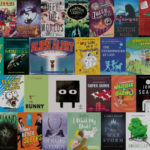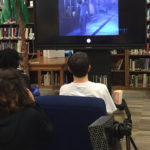We are excited to welcome Eileen Spinelli as our guest author today. Her most recent book, Birdie, is a novel in verse about a young girl struggling with grief and the changes in her life after her father died.
Check back here tomorrow for a contest. Two lucky entrants will each win a copy of Eileen’s new book, Birdie.
_____________________________________________________________________________________
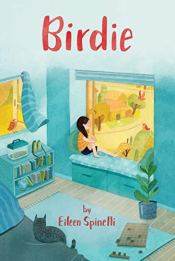 The writing process is different for each writer. And different at different stages of life.
The writing process is different for each writer. And different at different stages of life.
When I was a mother of young children I wrote, as my friend Jen Bryant likes to say, in the cracks.
I loved snow. When it happened, I gave each kid a carrot and sent them into the back yard to make snowmen. Crack…write!
I wrote poems while lingering over laundry. And picture books at midnight when everyone was asleep.
I wrote in doctors’ waiting rooms, at bus stops, on playground benches.
I learned to think—and write—fast, pulling out my steno pad to write for fifteen glorious minutes. Or five.
When the nest was down to my husband Jerry and me, I celebrated a new luxury: routine. Every day, after breakfast. Sometimes in my pajamas. Always in my writing chair. (I’ve had three so far). Black ballpoint pen. White unlined paper. A cup of tea at my elbow.

My Christmas gift of steno pads from Jerry!
And steno pad of notes. Jerry gives me a stack of steno pads every Christmas.
Sometimes the notes have originated on my smart-phone. I’m low-tech, so having 36 grand-and great-grandkids comes in handy.
I transcribe each day’s longhand work into print on the computer. Jerry likes to say I’ve been known to write a picture book between the first and fourth quarters of a football game he’s watching. I’m not that fast anymore.
When I was working on my novel-in-verse Birdie, I spent the first ten minutes looking out my office window at the birds. I have feeders and a birdhouse right outside.
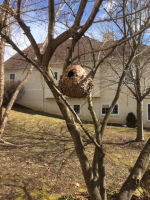
Eileen’s birdhouse
One thing has never changed: snags. I still run into them. The famous writer’s block. Or I just don’t feel like writing. How do I de-snag? Reading favorite passages or poems, sometimes out loud. Fifteen minutes on the jigsaw puzzle on the library room table. Puttering with my herbs. Watching the geese on the lake. The point: get away from it. And then back to it. By now I’m a slightly different person than I was fifteen minutes before. I’m ready.
Writing is, after all, my job, albeit one I love. Inspiration is seldom a daily boat-launcher; rather, it’s the gust that fills your sails when you’re already out to sea.
Interruptions? Sure. With all those grandkids how could there not be? Or cookies to bake for my knitting group. Or—oops—cracked tooth. Call the dentist. The flexibility from my in-the-crack days comes in handy. If something disrupts my morning routine, I shift to the afternoon. Or evening.
When I finish a poem or picture book manuscript or section of a novel, I show it to Jerry. We are each other’s first reader and editor. It’s not always comfortable, delivering a less-than-rave review, but we try to—need to—be honest with each other. The hard part comes when weighing our own attachment against the other’s dissenting opinion. We usually defer to First Reader.
So that’s my writing process.
As I said, different writers, different processes.
Unlike myself, my friend Elvira Woodruff dives into research for her historical fiction and sometimes mixes yesterday with today. Once at a restaurant in Vermont, the waiter described the specialties of the house: “Next we have rabbit torn from the bone.” Elvira immediately veered to pasta, but the words stayed with her, emerging ultimately from the mouth of an evil chimney sweep in 17th century England: “Have you ever tasted raven, lad? The meat torn from the bone?”
Another writing friend, Linda Trice, gets herself started with music. Linda has a different composition for each project. For instance, at the moment she is writing a biography of Charlotte Forten, set during the American Civil War. When she is ready to get to work, Linda plays “The Battle Hymn of the Republic”. It helps her to get into the head of her character. Especially the line: “Let us die to make men free.”
My friend Joan Donaldson and her husband manage a blueberry farm in Michigan. In winter Joan tries to block off 2-3 hours for writing each morning. During the summer, there are blueberry-packing days when she doesn’t write anything. But even as she is packing, she thinks about plots and characters (she interviews them) and when she can, she makes notes.
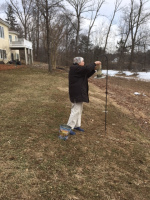
Husband Jerry filling the birdfeeder
The other author in our house, Jerry, is a morning writer too. He did not grow up reading and writing as I did. He wanted to become a baseball player. The early novels he wrote longhand and transcribed on an old Royal typewriter. And sent them in. Didn’t even bother to read them.
He’s more professional about it now. Each workday begins with reading out loud what he wrote the day before and making changes if need be. At the end, he reads aloud to himself the whole thing.
Writing is an exploration. We start from nothing and learn as we go. Ragtime author E. L. Doctorow compared it to driving at night. The writing you do today casts a beam only into tomorrow. For the day after that, you need to write your way through tomorrow.
The writing process is an exploration as well. Try different things and see what works for you. Cast your own beams and follow them.
Middle-grade fiction by Eileen Spinelli:
Birdie. 9780802855138. 2091. Gr 4-8.Another Day As Emily. 9780449809891. 2014. Gr 4-6.
The Dancing Pancake. 9780375853487. 2011. Gr 4-6.
Summerhouse Time. 9780375840616. 2007. Gr 3-5.
Find a list of picture books by Eileen Spinelli here.
_____________________________________________________________________________________
Autobiography (the short version):
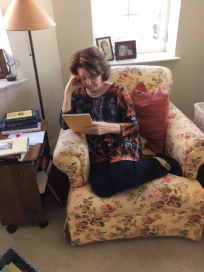
Eileen Spinelli in THE Chair
I was born in Philadelphia, Pennsylvania.
When I was six years old I began visiting our town library every Saturday. It was there that I fell in love with words and books and decided to become a writer.
In second grade, my teacher, Miss Campbell, read my homework composition aloud as the example of the worst one-handed in.
I’ve been writing ever since.
In high school, I won a poetry prize of $50. With that money, I bought myself a pair of red high heels and a used typewriter.
Fast forward to meeting my husband and fellow author, Jerry. He and I both worked for Chilton Publishing Company. He was an editor there and I was a file clerk who wrote poetry in my spare time. (In the cracks.)
One day while we were both waiting for a train, I dumped a folder of poems in his lap.
Eventually, we married. A pot luck wedding at Yellow Springs, PA. Jerry picked my bouquet–wildflowers by the creek. I wore a silk sunflower in my hair.
Then kids, six of them, a nestful. They’d have been jealous of Birdie’s room of her own.
Now the nest is empty. Sometimes. Grand and great-grandkids total 36.
So far.





